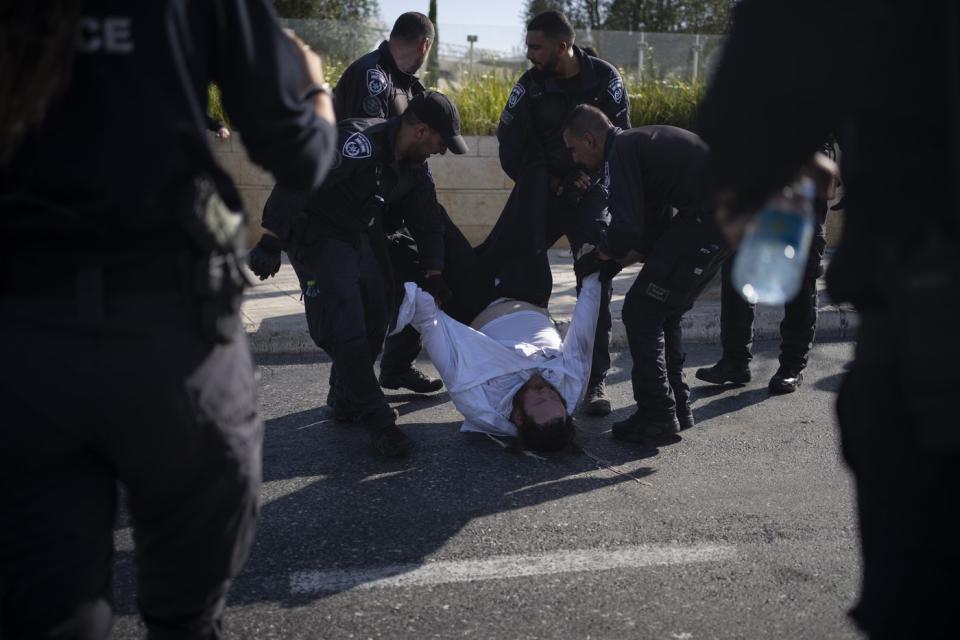Israel's military must enlist the ultra-Orthodox. What will that mean for Netanyahu and the war?
JERUSALEM (AP) — Israel's Supreme Court unanimously ordered the government to begin drafting ultra-Orthodox Jewish men into the army — a landmark ruling seeking to end a system that has allowed them to avoid enlistment into compulsory military service.
Roughly 1.3 million ultra-Orthodox Jews make up about 13% of Israel's population and oppose enlistment because they believe studying full time in religious seminaries is their most important duty.
An enlistment exemption for the ultra-Orthodox goes back to the founding of Israel in 1948, when small numbers of gifted scholars were exempt from the draft. But with a push from politically powerful religious parties, those numbers have swelled over the decades. The court said the exemptions were illegal in 2017, but repeated extensions and government delay tactics have prevented a replacement law from being passed.
Two parties belonging to the Haredim, or “god-fearing” in Hebrew, are essential parts of Prime Minister Benjamin Netanyahu’s fragile coalition, but the broad exemptions from mandatory military service have reopened a deep divide in the country and infuriated much of the general public during the war in Gaza. Over 600 soldiers have been killed since Hamas’ Oct. 7 attack. Many reserve soldiers are starting their second tour of duty.
What does the ruling mean for Netanyahu’s government?
Netanyahu’s coalition holds a slim majority of 64 seats in the 120-member parliament, often requiring him to capitulate to the demands of smaller parties like the ultra-Orthodox.
If those parties leave the government, the country would likely be forced into new elections this fall. Netanyahu's popularity is low as the war in Gaza drags into its ninth month.
Housing Minister Yitzhak Goldknopf heads one of the ultra-Orthodox parties in Netanyahu's coalition. In a post on X, Goldknopf called the Supreme Court's ruling “very unfortunate and disappointing,” but did not say whether his party would leave the government. The chairman of the ultra-Orthodox Shas party, Aryeh Deri, denounced the ruling and said religious study was “our secret weapon against all enemies.”
The court this year temporarily froze state subsidies for seminaries where exempted ultra-Orthodox men study. Along with the enlistment decision, the court also ruled Tuesday that that money should be permanently suspended.
Many religious seminaries depend on government funding and “the general assumption is that the government will not survive this crisis,” said Barak Medina, a law professor at the Hebrew University of Jerusalem and an expert on constitutional law.
What did the courts rule?
Military service is compulsory for most Jewish men and women, who serve three and two years, respectively, in active duty, as well as reserve duty until around age 40.
The Israeli Supreme Court ruled that compulsory military service applies to the ultra-Orthodox just like any other Israeli. The judges said that allowing a certain community a “sweeping avoidance” of service amounted to discrimination.
“Discrimination regarding the most precious thing of all – life itself – is the worst kind,” the justices wrote in their opinion.
In 2017, the Supreme Court struck down a law that codified draft exemptions. Repeated extensions of the law and government tactics to delay a replacement law have dragged on for years.
Israel’s judiciary plays a large role in checking the government’s executive power. Netanyahu attempted to overhaul the judiciary last year, spurring massive protests across the country before a major part of the overhaul was struck down.
When will this go into effect?
It will be challenging for the army integrate a larger number of ultra-Orthodox deeply opposed to service into its ranks.
Among Israel’s Jewish majority, mandatory military service is largely seen as a melting pot and a rite of passage. The ultra-Orthodox say that integrating into the army will threaten their generations-old way of life, and that their devout lifestyle and dedication to upholding the Jewish commandments protect Israel as much as a strong army does.
The courts did not set numbers for enlistment in their ruling, but Israel’s attorney general’s office suggested that at least 3,000 ultra-Orthodox soldiers enlist in the coming year. The court said in its ruling that some 63,000 ultra-Orthodox students are eligible for enlistment.
For decades, the army has attempted to accommodate ultra-Orthodox soldiers by creating separate units that allow them to maintain religious practices, including minimizing interaction with women. One of the units created for this purpose, Netzah Yehudah, faced possible U.S. sanctions over their treatment of Palestinians, though the U.S. eventually decided not to impose sanctions.
What impact will this have on the war in Gaza?
The ruling will have little immediate effect on the war in Gaza, where more than 37,600 Palestinians have been killed, according to the territory’s Health Ministry, which does not distinguish between combatants and civilians in its count. The number of ultra-Orthodox who might enlist because of the ruling is too small to have a significant impact on day-to-day fighting.
Medina, the law professor, said that if the ruling topples the government, it could give Netanyahu more leeway to reach a deal for a ceasefire that could end the war in Gaza.
“Currently, one of the main reasons he’s prevented from reaching an agreement for the end of the war is because it will mean the end of his coalition,” said Medina.
If the ultra-Orthodox parties leave the coalition, Netanyahu has “nothing to lose,” he said. And that could lead to a change in policy without the pressure from far-right ministers opposed to any kind of ceasefire. Netanyahu will also be under a lot of pressure to wrap up fighting if early elections are called, to avoid going into the elections without the hostages and while a war is still ongoing, Medina said.
___
Follow AP's coverage of the war at https://apnews.com/hub/israel-hamas-war
Melanie Lidman, The Associated Press



